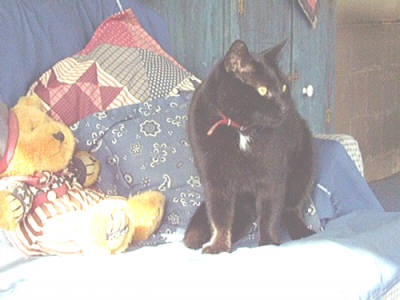I've heard it's
possible to Salmonella
from my Cat?
|
|
Please Help Pets with a Gift of One Dollar
Diseases you can catch from your Cat - Salmonellosis
By: Alfred
Another disease that can be spread from cats to humans,
although it rarely happens, is Salmonellosis. Salmonella is
a gram-negative bacterium most commonly known for causing
inflammation of the intestines (enteritis). The almost two
thousand types of Salmonella live in the digestive tracts of
many species of amphibians, reptiles, birds and mammals.
Cats can get Salmonellosis from eating infected prey, or
from the feces or saliva of an infected animal. Salmonella
can survive in food or on surfaces for long periods of time.
Salmonella is not that common in cats, but it is zoonotic,
which means that it can be passed from cats to humans, so it
is a serious disease.
Salmonellosis in cats can cause:
* Vomiting
* Diarrhea, sometimes bloody
* Lack of appetite
* High fever and dehydration
* Weakness
* Abdominal pain
* Inflammation of the liver
* Swollen lymph nodes
* Miscarriage in pregnant females,
Salmonellosis in humans can cause:
* Diarrhea
* Fever and Dehydration
* Stomach Pain/Cramps
These symptoms usually appear three days after being
infected. This disease will usually run its course in
healthy adult humans and they will be fine. But there can be
complications in humans when the person with a severe case
of diarrhea becomes dehydrated. In that case they will have
to be hospitalized to bring the fluids and the diarrhea back
under control. Sometimes if the bacterial infection is
severe the diarrhea will affect other organs and cause
complications.
The most common way to get Salmonellosis is by eating
under prepared or undercooked foods such as chicken and eggs.
Cats and other animals can carry the bacteria and infect
humans through contact with that animal's feces. More
commonly, cats that feed on raw meat will carry salmonella.
This type of bacterial infection can be controlled by
keeping your cats indoors and only feeding them prepared
food or commercial cat food. You can prevent yourself from
becoming infected by wearing gloves and washing hands
thoroughly with anti-bacterial soap after cleaning the
litter box, especially if the cat's had diarrhea. Keep
Salmonella from infecting foodstuffs by keeping protein-rich
foods at proper temperatures that don't allow Salmonella to
multiply.
Don't worry too much about catching Salmonella from your cat
unless it has been diagnosed with an infection. Proper
hygiene, cleaning surfaces that touch food with bleach, and
keeping foods at proper temperatures are excellent
preventative measures.
Alfred

Alfred Says: Check out my Favorite Feline Treats
|